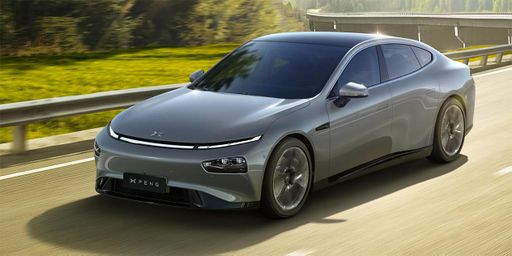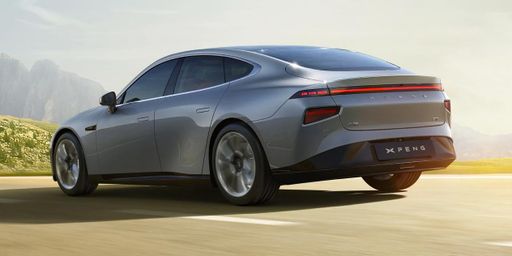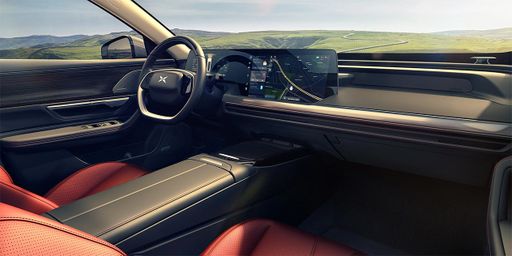Nissan Interstar VS XPeng P7 – Specs, Efficiency & Price Comparison
Which model is the better choice – the Nissan Interstar or the XPeng P7? We compare performance (180 HP vs 473 HP), boot capacity ( vs 440 L), efficiency (7.40 L vs 16.80 kWh), and of course, the price (33300 £ vs 42500 £).
Find out now which car fits your needs better!
The Nissan Interstar (Cargo Van) is powered by a Diesel or Electric engine and comes with a Manuel or Automatic transmission. In comparison, the XPeng P7 (Sedan) features a Electric engine and a Automatic gearbox.
When it comes to boot capacity, the Nissan Interstar offers , while the XPeng P7 provides 440 L – depending on what matters most to you. If you’re looking for more power, you’ll need to decide whether the 180 HP of the Nissan Interstar or the 473 HP of the XPeng P7 suits your needs better.
There are also differences in efficiency: 7.40 L vs 16.80 kWh. In terms of price, the Nissan Interstar starts at 33300 £, while the XPeng P7 is available from 42500 £.
Compare all the key specs now and find out which model fits your lifestyle best!
Nissan Interstar
The Nissan Interstar is a versatile van that expertly combines practicality with modern design. It offers a spacious interior that caters to both cargo and passenger needs, making it ideal for businesses and families alike. With its robust performance and efficient fuel consumption, the Interstar stands out as a reliable choice in the commercial vehicle market.
detailsXPeng P7
The XPeng P7 is a sleek and stylish electric saloon that embodies the future of automotive innovation. With its modern design and advanced technology, it offers an impressive driving experience, combining luxury with sustainability. The interior is thoughtfully designed to provide comfort and convenience, making it a strong contender in the competitive market of electric vehicles.
details @ XPeng
@ XPeng
 @ XPeng
@ XPeng
 @ XPeng
@ XPeng

|
|
|
|
|
Costs and Consumption |
|
|---|---|
|
Price
33300 - 54400 £
|
Price
42500 - 59700 £
|
|
Consumption L/100km
7.4 - 7.5 L
|
Consumption L/100km
-
|
|
Consumption kWh/100km
-
|
Consumption kWh/100km
16.8 - 19.2 kWh
|
|
Electric Range
400 km
|
Electric Range
505 - 576 km
|
|
Battery Capacity
-
|
Battery Capacity
82.70 kWh
|
|
co2
0 - 195 g/km
|
co2
0 g/km
|
|
Fuel tank capacity
80 - 105 L
|
Fuel tank capacity
-
|
Dimensions and Body |
|
|---|---|
|
Body Type
Cargo Van
|
Body Type
Sedan
|
|
Seats
3 - 7
|
Seats
5
|
|
Doors
4
|
Doors
5
|
|
Curb weight
1927 - 2538 kg
|
Curb weight
2020 - 2180 kg
|
|
Trunk capacity
-
|
Trunk capacity
440 L
|
|
Length
5048 - 6848 mm
|
Length
4888 mm
|
|
Width
2070 - 2222 mm
|
Width
1896 mm
|
|
Height
2307 - 2808 mm
|
Height
1450 mm
|
|
Payload
845 - 1451 kg
|
Payload
420 - 430 kg
|
Engine and Performance |
|
|---|---|
|
Engine Type
Diesel, Electric
|
Engine Type
Electric
|
|
Transmission
Manuel, Automatic
|
Transmission
Automatic
|
|
Transmission Detail
Manual Gearbox, Automatic Gearbox, Automated Manual, Reduction Gearbox
|
Transmission Detail
-
|
|
Drive Type
Front-Wheel Drive, Rear-Wheel Drive
|
Drive Type
Rear-Wheel Drive, All-Wheel Drive
|
|
Power HP
105 - 180 HP
|
Power HP
276 - 473 HP
|
|
Acceleration 0-100km/h
-
|
Acceleration 0-100km/h
4.1 - 6.7 s
|
|
Max Speed
120 - 177 km/h
|
Max Speed
200 km/h
|
|
Torque
300 - 400 Nm
|
Torque
440 - 757 Nm
|
|
Number of Cylinders
4
|
Number of Cylinders
-
|
|
Power kW
77 - 132 kW
|
Power kW
203 - 348 kW
|
|
Engine capacity
1997 - 2299 cm3
|
Engine capacity
-
|
General |
|
|---|---|
|
Model Year
2021 - 2024
|
Model Year
2024
|
|
CO2 Efficiency Class
G, A
|
CO2 Efficiency Class
A
|
|
Brand
Nissan
|
Brand
XPeng
|
Nissan Interstar
The Evolution of the Nissan Interstar
The Nissan Interstar has long been a staple in the commercial vehicle sector, known for its robust build and practical design. The latest iterations have further cemented its status with a range of technical enhancements and innovative features aimed at aiding businesses in achieving optimal efficiency. Whether you're navigating city streets or traversing the highways, the Interstar stands out as a reliable workhorse ready to meet various transport needs.
Power and Performance
The current range of Nissan Interstar models boasts diesel engines ranging from 105 to 180 PS, offering a commendable blend of power and fuel efficiency across the board. With a fuel consumption of between 7.4 and 7.5 litres per 100 kilometres, these vehicles are designed to minimise operational costs while maximizing performance.
All models feature four-cylinder engines, with engine displacement between 1997 and 2299 cm³, capable of producing torque figures between 330 and 400 Nm. These specifications ensure that the Interstar offers superior pulling power, which is particularly useful for transporting heavy loads across different terrains.
Transmission and Drive Options
Versatility is at the heart of the Nissan Interstar, with transmission options including both manual and automatic gearboxes. Drivers can also choose between front-wheel and rear-wheel drive configurations, allowing the vehicle to suit specific logistical requirements or personal preferences.
For those seeking simplicity and ease of use in urban environments, the Interstar with its automated gearshift provides a smooth driving experience, reducing driver fatigue and increasing focus on the road ahead.
Dimensions and Load Capacities
The Nissan Interstar is available in various lengths, from 5048 mm to an extensive 6848 mm, catering to diverse commercial needs. With widths ranging from 2070 mm to 2222 mm and heights from 2307 mm to 2808 mm, the Interstar offers multiple configurations to maximise cargo space and accommodate various loads.
With a maximum payload capacity of up to 1451 kg, businesses can rest assured that the Interstar is more than capable of delivering goods efficiently without compromising on safety or comfort.
Innovation and Technological Features
While functionality remains a priority, Nissan has not skimped on technological advancements. Among the innovations included are advanced safety features, such as anti-lock braking systems (ABS), electronic stability control (ESC), and a variety of sensors to assist with parking and reversing.
In terms of driver comfort, the brand offers multiple trim levels with exceptional interior features designed to enhance driver experience during long hauls. Options such as climate control, advanced navigation systems, and modern infotainment setups are available, ensuring that both driver and passenger remain comfortable and connected, regardless of the journey length.
Coachwork and Trim Options
The Interstar line-up provides a range of trim levels and equipment lines, from the entry-level Visia to the high-spec Tekna, catering to different market demands and individual preferences. The selection allows buyers to prioritise features that best suit their operation or driving style.
For example, the N-CONNECTA variant offers an array of added extras, enhancing both connectivity and comfort for drivers who rely on the vehicle as a mobile office.
Conclusion
The Nissan Interstar represents a harmonious blend of power, efficiency, and technological innovation in the large van segment. With its vast array of options and features, the Interstar is undeniably a top choice for businesses looking to invest in a dependable and adaptable commercial vehicle. As the line-up continues to evolve, the Interstar remains poised to meet the growing challenges and demands of the modern logistic landscape.
XPeng P7
Introducing the XPeng P7: A Revolution on Wheels
The XPeng P7 is not just a car; it's a statement. As an electric sports saloon, it combines cutting-edge technology with sleek design, redefining the standards of modern electric vehicles.
Performance That Puts the "Power" in Powertrain
At the heart of the XPeng P7 is a choice between rear-wheel and all-wheel drive systems, delivering phenomenal power of between 276 to 473 PS. With the top performance model accelerating from 0 to 100 km/h in just 4.1 seconds, this is a vehicle built for speed enthusiasts.
Impressive Range and Efficiency
The P7 boasts an electric range between 505 km and 576 km, thanks to its efficient power consumption of 16.8 to 19.2 kWh/100km and a substantial battery capacity of 82.7 kWh. This places it among the most efficient electric vehicles currently available.
Innovations for a Connected Journey
The XPeng P7 is equipped with the latest in automotive technology. Advanced driver-assist systems provide automatic steering and braking, ensuring both safety and comfort on long drives. Furthermore, its intelligent cockpit features a large touchscreen and AI voice interaction, keeping drivers connected and informed at all times.
Design and Comfort: Where Function Meets Form
With its stunning fastback design, the P7 is as attractive as it is aerodynamic. Measuring 4,888 mm in length, 1,896 mm in width, and 1,450 mm in height, this saloon offers ample space for passengers and boasts a generous 440-litre boot, easily accommodating the needs of a family or a business traveller.
Sustainability with Effective Luxury
While offering zero emissions and a CO2 efficiency rating of A, the XPeng P7 doesn't compromise on luxury. Featuring premium materials and finishes, the cabin environment is serene and sophisticated, making every journey a pleasure.
Pricing and Availability
Available with a price range between €49,600 and €69,600, the XPeng P7 provides various configurations that cater to different performance and lifestyle needs, offering a value proposition that few competitors can rival.
Conclusion
The XPeng P7 stands out in the crowded electric vehicle market through its exceptional balance of performance, technology, and design. It's a bold step forward for the brand, setting new standards for what drivers can expect from a modern electric saloon.
The prices and data displayed are estimates based on German list prices and may vary by country. This information is not legally binding.
